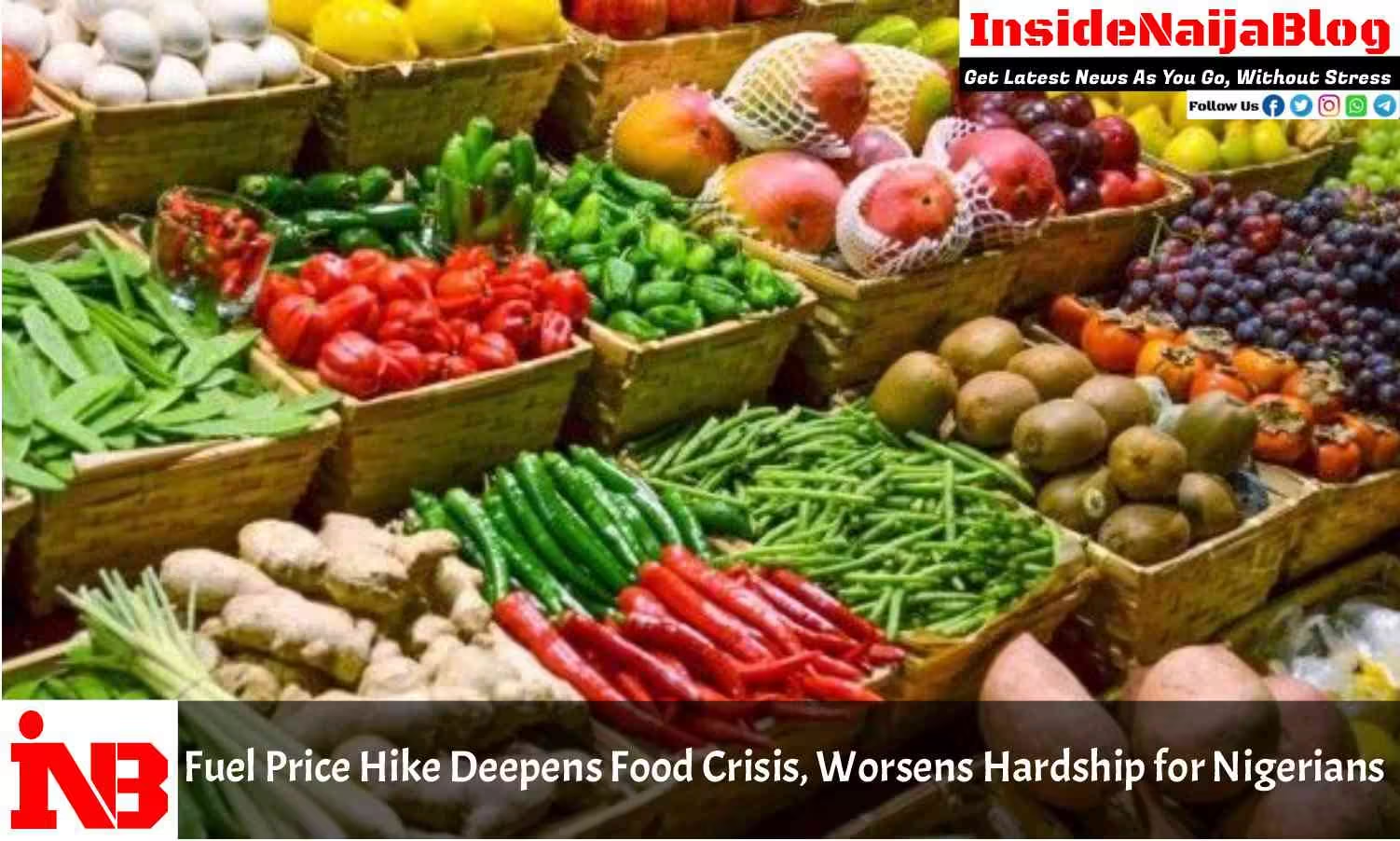The recent increase in the price of fuel, which saw petrol soar from an average of N870 to N1,120 per litre, has triggered a sharp rise in the cost of food items across Nigeria, causing significant hardship for many citizens. Sellers and consumers alike in the Federal Capital Territory (FCT) have expressed concern over the escalating prices of essential food commodities, attributing the increases largely to the rising cost of transportation, which has been directly impacted by the fuel price hike.
The connection between fuel prices and the cost of goods and services in Nigeria is profound, as transportation costs are a major determinant of overall food prices. From the farmers who produce the food to the traders who transport it to markets, everyone is feeling the pinch of the fuel price increase, and these rising costs are inevitably being passed on to consumers.
Skyrocketing Food Prices Across Markets
A recent survey by the News Agency of Nigeria (NAN) revealed how drastically food prices have risen since the fuel price hike. Basic staples like rice, beans, garri, fruits, vegetables, eggs, and cooking oil have all witnessed steep increases, causing alarm among both sellers and consumers. For instance, a bag of cucumber that previously sold for between N20,000 and N25,000 is now being sold for N55,000, more than double its previous price. Similarly, a carton of apples, which used to cost N40,000, now sells for between N76,000 and N80,000.
Other vegetables have seen similar price hikes. A bag of cabbage, which cost N10,000 before the fuel increase, is now being sold for between N20,000 and N25,000, while a bag of carrots has shot up from N35,000 to between N40,000 and N55,000. These price hikes have left both sellers and buyers struggling, as food items that were once considered affordable have become almost out of reach for the average Nigerian.
Animal products are not exempt from this inflationary trend. The price of a kilo of chicken, for example, has increased from N4,000 to between N4,500 and N5,500, depending on the seller. A carton of chicken, which was previously sold for N40,000 to N45,000, is now selling for up to N55,000. Similarly, the price of fish has risen dramatically, with a carton of panla fish now costing between N40,000 and N47,000, and the price of a kilo of goat meat, once N5,500, now ranging from N6,000 to N7,000. The cost of cow meat has also surged, with a kilo selling for up to N7,000.
Other staple foods have seen similar increases. A crate of eggs, which previously sold for N6,000, now costs between N7,000 and N7,500. Half a bag of garri, a popular Nigerian food item, has risen from N34,000 to between N36,000 and N38,000. Even tomatoes, a key ingredient in many Nigerian dishes, have become significantly more expensive, with a medium basket now selling for between N10,000 and N15,000. Rice, a staple food for millions of Nigerians, has seen its price skyrocket, with a 50 kg bag now selling for between N84,000 and N120,000, depending on the brand and market.
Traders Speak Out: “Transportation Costs Have Tripled”
For traders in the FCT, the impact of the fuel price increase has been severe. Many have expressed frustration over the rising costs of transporting goods from rural farming areas to city markets. Stella Ayanwu, who sells frozen food at Nyanya Market, explained that the cost of transporting frozen foods has more than tripled since the fuel price hike. “Before, we used to pay N1,500 to transport frozen food from Kado Market, but now we pay N5,000,” she lamented. “We really feel for our customers, but there’s nothing we can do. Everybody is suffering from it. We, too, have needs to meet.”
Salisu Abubakar, a fruit and vegetable seller at Wuse Market, echoed these concerns, explaining that the cost of transporting fruits and vegetables from Orange Market in Nasarawa State had skyrocketed. “Before the price of fuel increased, a bag of cabbage was N10,000, but now it is N20,000, and a bag of carrot was N35,000, but now it is N55,000,” he said. The rise in fuel prices has not only increased transportation costs but has also affected the livelihoods of farmers and traders, who now have to cope with higher operating expenses.
Chinedu Okeke, a trader at Garki Market, pointed out the constant fluctuation in food prices, which has left both sellers and buyers in a state of uncertainty. “Prices change by the hour. There is no fixed price for any food item again, from garri to rice to even maggi [seasoning cubes],” he said. Okeke cited the example of groundnut oil, which was selling for N70,000 one day but rose to N85,000 the next day. “Our customers are really lamenting,” he added. “Many just buy in small quantities and leave.”
Consumers Lament: “It’s Unbearable”
The steep rise in food prices has placed a heavy burden on consumers, many of whom are already grappling with the high cost of living. Binta Idris, a public servant, described the situation as unbearable, noting how the price of food items seems to change every time she visits the market. “I bought one kilo of chicken two weeks ago for N4,000. Last Saturday, it increased to N4,500, and today it is N4,700. Some people are selling for N5,000 and N5,500 per kilo,” she said.
Mrs. Ejiro Jonathan, a banker, expressed frustration over the rising cost of basic food items, stressing the link between fuel prices and food inflation. “The government must know that with every increase in petrol price, Nigerians will suffer because petrol affects the price of transportation. When transportation fares are high, food prices will surely increase,” she said. Jonathan, like many others, called on the government to address the issue of fuel prices urgently.
Mr. Chukwuma Eze, a businessman, lamented that the recent fuel price increase had reversed the temporary relief Nigerians had begun to feel during the farming season when food prices were expected to come down. “When we thought the price of some food items was coming down because of the farming season, we woke up to another increase in fuel prices, and it has affected the prices of food items,” he said. Eze appealed to the government to act urgently, noting that many households and businesses are struggling to cope with the rising cost of living.
The Need for Urgent Government Intervention
Economists and food experts agree that the increase in food prices is directly linked to the rise in fuel prices, as transportation costs form a significant part of the pricing mechanism for food commodities. Sunday Peter, an economist and agro-consultant, explained that the cost of transporting goods from farms to markets has been a major factor in the rise of food prices. “When the farmers come from the farm, they have to meet their own domestic needs, so they increase the prices because the person who is carrying the goods from the farm to the market has increased his own cost of transportation,” he said.
Peter further advised the government to take immediate action to address the issue of fuel prices, suggesting that opening up the fuel market to competition and fixing the country’s refineries could help bring prices down. “If the government wants to have a serious impact on the reduction of food prices, they need to reduce fuel prices, and they are aware of the policies that can achieve this,” he said. He added that allowing more companies to import fuel and increasing competition in the fuel market could help stabilize prices and reduce the pressure on food costs.
Rising Hardship for Nigerians
As food prices continue to rise, Nigerians are increasingly calling on the government to address the underlying issues driving inflation, particularly the recent fuel price hike. For many citizens, the daily struggle to afford basic food items is becoming overwhelming, and without government intervention, the situation could worsen. With transportation costs soaring and food prices changing by the hour, the need for urgent and decisive action has never been more critical.




